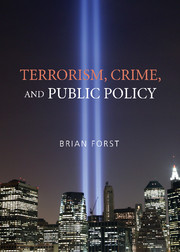Book contents
- Frontmatter
- Contents
- Credits
- Preface
- Acknowledgments
- 1 The Nature of Terrorism
- 2 Theories of Aggression and Terrorism
- 3 A Brief History of Terrorism
- 4 Two Trajectories of Humankind: Globalization or Clash?
- 5 Religion, the State, and Terrorism
- 6 Nonreligious Extremism and Terrorism
- 7 Technology and Terrorism
- 8 Terrorism throughout the World
- 9 Responses to Terrorism
- 10 Fear of Terrorism
- 11 Preventing Terrorism: Short-Term Approaches
- 12 Preventing Terrorism: Long-Term Strategies
- 13 Balancing Security and Rights to Liberty and Privacy
- 14 Toward a Safer and Saner Twenty-First Century
- Notes
- References
- Index
9 - Responses to Terrorism
Published online by Cambridge University Press: 05 June 2012
- Frontmatter
- Contents
- Credits
- Preface
- Acknowledgments
- 1 The Nature of Terrorism
- 2 Theories of Aggression and Terrorism
- 3 A Brief History of Terrorism
- 4 Two Trajectories of Humankind: Globalization or Clash?
- 5 Religion, the State, and Terrorism
- 6 Nonreligious Extremism and Terrorism
- 7 Technology and Terrorism
- 8 Terrorism throughout the World
- 9 Responses to Terrorism
- 10 Fear of Terrorism
- 11 Preventing Terrorism: Short-Term Approaches
- 12 Preventing Terrorism: Long-Term Strategies
- 13 Balancing Security and Rights to Liberty and Privacy
- 14 Toward a Safer and Saner Twenty-First Century
- Notes
- References
- Index
Summary
This chapter addresses principles for and alternative approaches to responding to terrorism. We begin with the most basic questions of how to use diplomacy and when to rely on force to intervene against terrorism, using the “just war” theory as a basis for addressing these fundamental issues. We then turn to the question of collective or unilateral responses. Specific interventions are then discussed, including the tactic of torture to extract information, covert and other special operations, use of bounty programs and extradition treaties to facilitate the capture of terrorists, and international courts and tribunals to decide in such cases.
Investigative, Diplomatic, and Military Responses
After the initial shock, serious terrorist attacks are usually countered quickly by a mix of investigative and diplomatic activities and, in some cases, a military response. The first objective is to establish the source or sources of the attack and then to mobilize power against the terrorists both to deal with immediate threats and deter future attacks. To achieve this first objective, standard crime scene forensic analysis is used to establish the “signature” of the attacker or attackers. Investigative methods include the following:
Thorough search and photographic documentation of the scene
Deliberate recovery of evidence
Chemical analysis of explosives
Ballistics tests to establish the precise location and impact of the explosion
Methods to determine the identity of the bomber
Analysis of earlier intelligence reports of suspected individuals and groups involved
Analysis of prerecorded confession tapes of suicide bombers
Interrogation of suspected collaborators
Interviews of witnesses
Analyses of telephone records, bank and credit card data, receipts, and computer files
- Type
- Chapter
- Information
- Terrorism, Crime, and Public Policy , pp. 250 - 298Publisher: Cambridge University PressPrint publication year: 2008



